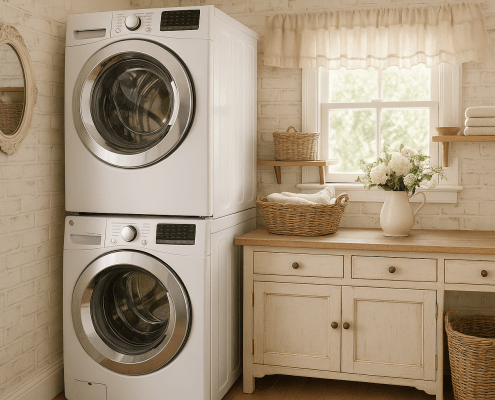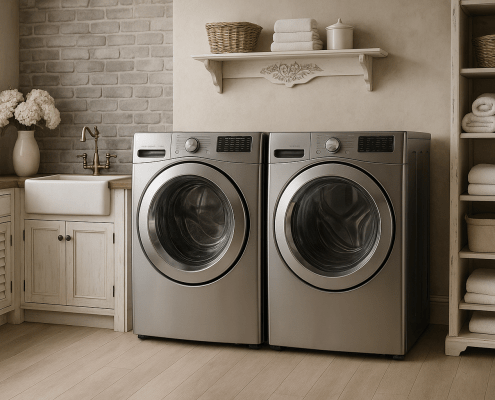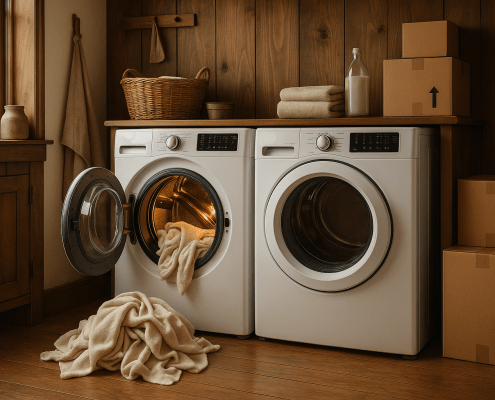Why your front-load washer is making a grinding noise & how to fix it
Samantha Bullington / Tuesday January 30, 2024
Is your washer making unsettling grinding noises that echo through your home? Silence the chaos with quick and easy fixes that can often be tackled without a hefty bill. Dive into our guide for solutions and catch our helpful how-to video just below for a peaceful, quiet laundry experience.
It starts with a small rumble and then escalates to a full-on grinding symphony – your front-load washer seems to be auditioning for a spot in a metal band. But the only gig you want it to play is the one where it spins silently and smoothly, washing your clothes without drama. A washer shouldn’t sound like it’s chewing on rocks, and when it does, it’s a sign that something’s amiss in laundry land.
But this isn’t the end of your washer’s silent serenades, and don’t worry about expensive repairs just yet. Most of the time, grinding noises come from minor problems that you can fix yourself without spending a fortune.
Just remember, if you do need parts for your washer, you can enter your model number at AppliancePartsPros.com to order them. Most orders arrive in just two business days, and we have thousands of free videos to show you how to install your new parts.
Let’s get to the bottom of that grinding noise that’s disrupting the peace in your home.
READ MORE: How to Deep Clean a Washing Machine
Keep safety first
When working on any appliance, always keep safety first to avoid personal injury or damage to the appliance or parts. Here are some tips to keep in mind:
- Always power off and unplug your appliance or switch off the circuit breaker before attempting any maintenance or replacement work. This keeps you safe by preventing any risk of electric shock.
- If the appliance has recently been used, give it plenty of time to cool down before working on it.
- Take your time and don’t rush while working to prevent accidents and personal injuries.
- Work in a well-lit area so you can clearly see and access appliance parts.
- Keep your workspace free of clutter and other obstacles. Keep children and pets away from the work area.
- Never work on internal parts with wet hands. Make sure the work area is completely dry.
- Check the user manual to see if there are specific installation or safety instructions related to your appliance or replacement part.
- Be gentle when handling or removing parts. Excessive force might damage the appliance or cause personal injury.
- Wear insulated work gloves to protect your hands from sharp metal parts and debris.
- When working with wires, avoid touching any exposed wires or terminals. If you need to touch a wire, use a non-conductive tool or wear insulating gloves to prevent electrical shock.
- Consider wearing safety glasses and/or a dust mask when working with chemicals, dust or a large amount of debris to prevent irritation or injury.
Common causes of grinding sounds
An unbalanced load
If your laundry is all bunched up on one side of the drum, it can make the washer shake and create loud noises during the spin cycle. This can also put extra stress on the washer’s components and make them more likely to fail faster than usual.
- Spread clothes out evenly inside the drum to avoid unbalanced loads.
- Mix large and small items for better load distribution.
- Avoid washing single heavy pieces like comforters. Take these to a laundromat where they can be cleaned in a large commercial machine.
- Set the load to a lower spin speed for the first couple of minutes to allow items to redistribute themselves.
- Don’t exceed the maximum capacity listed for your washer model to keep things in balance.
- If you start hearing grinding noises during the cycle, just pause the washer and give the laundry a quick shuffle before hitting restart.
READ MORE: WHAT’S A FULL LOAD OF LAUNDRY?
A clogged drain filter/pump
A front-load washer might also make a grinding noise if the drain filter or pump gets clogged. Over time, lint, debris, and other gunk can build up and block the water from draining properly. When this happens, the washer might have trouble spinning and make loud grinding or rattling sounds.
To fix it:
- Use a toothbrush or pipe cleaner to remove any gunk or buildup from the drain filter.
- Check the drain hose and clear any blockages you find. Be very careful not to puncture the hoses when removing clogs.
- Disconnect the hoses and physically remove debris from the pump impeller.
Preventive maintenance:
- Periodically clean the drain filter.
- Run a tub clean cycle to avoid clogs and keep your washer quiet.
- If noises persist despite cleaning, the pump may be faulty and need to be replaced.
READ MORE: How to Prevent and Remove Mold from Your Front-Load Washer
A foreign object stuck in the drum
Coins, buttons, pins, screws, you name it – these little troublemakers can cause a grinding sound as the washer spins. And metal objects like coins can be a real headache if they decide to wedge themselves between the drum and the outer tub.
To check for any foreign items that may be stuck, take a close look inside the drum:
- Use a flashlight to inspect the drum from all angles.
- Spin the drum by hand to check the entire drum surface.
- Remove any foreign objects using tweezers or pliers. Avoid using sharp tools to prevent damage to the drum.
Preventive maintenance:
- Always empty all pockets before washing.
- Shake out laundry before loading it into the washer.
- Avoid overloading the drum.
READ MORE: Tips For Preventing Laundry Damage in Your Washing Machine
Motor issues
The motor facilitates the spinning of the drum during wash cycles. If the motor is defective or damaged, it might struggle to spin properly and make grinding noises.
Some motor issues that could be behind the sounds:
- Broken motor components.
- Electrical faults that prevent proper spin speeds.
- Motor age.
- Power surges and fluctuations that damage motor windings and cause malfunctions.
How to fix it:
- Visually inspect the motor for any obvious physical damage
- Use a multimeter to test the motor’s resistance. Refer to your model’s manual or tech sheet to determine the acceptable level of resistance.
READ MORE: How to Decide What Water Temperature to Use for Laundry
Worn-out drum bearings
The drum bearings in your washer help the inner drum spin smoothly and quietly. But over time, they can wear out and make grinding noises during spin cycles. As the bearings wear out, the drum can start wobbling and knocking around, making a grinding or rattling sound.
Check the bearings for any signs of wear or damage. If you see any, they will need to be replaced.
Preventive maintenance
- Clean the drum monthly using a tub cleaner or bleach wash cycle to scrub away any grime or buildup inside the drum.
- Periodically check and clean the drain pump filter according to your manual. Remove any lint or gunk clogging the pump.
- If you have hard water, use a monthly descaling wash with a descaling solution to prevent mineral deposit buildup.
- Check all rubber seals around the drum and door for cracks or moisture buildup. Replace any worn seals to prevent leaks.
- Make sure the washer is level to prevent excessive vibration and premature wear.
More information
Thanks for reading! If you have any other appliance repair needs or projects, you can find more resources including our DIY blog at AppliancePartsPros.com. There, you can enter your model number to order the exact parts you need. Most orders arrive in two business days. We can also help you troubleshoot common washer problems here.
You can also reach our award-winning customer service team at 1-877-477-7278, chat with a pro on our website and watch thousands of free video tutorials on our YouTube channel.
Hey there, I’m Samantha and I’m super excited to be a part of the Appliance Parts Pros team! With 9 years of experience, I’ve had the awesome opportunity to assist countless customers in troubleshooting their home appliances and finding DIY repair solutions.





